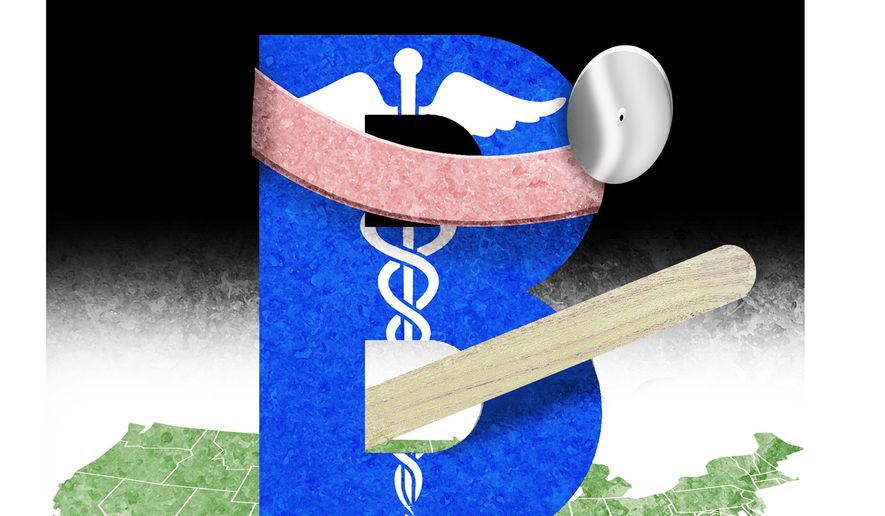OPINION:
In last week’s State of the Union address, President Biden touted efforts by his administration to strengthen American health care, saying, “we’re taking on powerful interests to bring your health care costs down so you can sleep better at night.”
It’s a solid applause line. But what has the Biden administration actually done around health care? Not much to be proud of.
The White House and its allies in Congress have injected more government into medicine rather than relying on free market mechanisms that work in nearly every other sector of the U.S. economy. The Inflation Reduction Act — a key vehicle of Mr. Biden’s health care agenda — is a prime example.
The legislation — passed and signed into law last year — included an extension of enhanced Affordable Care Act subsidies. While proponents argue that the move lowers payments for Americans on Obamacare exchanges, it does nothing to address the true cost of care. The sleight of hand simply shifts when and who is feeling the financial squeeze. And in this case, it’s the taxpayers. The extension is expected to cost roughly $64 billion over three years.
And like the quagmire of college tuition costs, more government health care spending begets even higher costs. It’s a merry-go-round that’s difficult to stop.
On top of dumping more taxpayer dollars into health care, the IRA applies government price controls to prescription drugs accessed through Medicare. While this strategy may be attractive to rein in the cost of some medication in the short run, it does nothing to address the main reason why U.S. expenditures on prescription drugs have tripled since 2000.
The middlemen of the drug supply chain — called pharmacy benefit managers — are major culprits behind rising drug prices. Through their pay-for-play scheme, the entities clandestinely inflate the cost patients pay for medication by billions of dollars a year to pad their own pockets.
Research from Georgia Republican Rep. Buddy Carter, a former pharmacist, finds that PBMs retain nearly 70% of total U.S. spending on medicine. Demonizing drugmakers — a common scapegoat for Democrats — is misplaced ire.
Government price controls also compromise health care innovation. On average, it costs $2.6 billion to bring a new drug to market. If companies are unable to recoup research and development expenses because of government price manipulation, the pipeline of new drugs will slow down — limiting access to lifesaving treatments, therapies and vaccines.
This scenario is no longer hypothetical; it’s reality. Since the passage of the IRA, some drugmakers have already scaled back investments in new cancer treatments. This is only the beginning. It will take years to realize the full extent to which innovation has been sabotaged and lives have been lost.
Considering these unintended consequences, it’s troubling that the Biden administration and its allies in Congress continue to barrel down this path to socialized medicine — and, even worse, hang their hats on it. The alarming consequences of the approach are on full display across the pond. As one recent headline succinctly put it, “The U.K.’s Government-Run Healthcare Service is in Crisis.”
Socialized health care has Britons facing rationing and falling quality of care.
On average, those who have had a heart attack or stroke wait more than an hour and a half for an ambulance. About 20% of residents are on waiting lists for an appointment or treatment. One in 10 are waiting for nonemergency procedures such as hip replacements. And most concerningly, the Royal College of Emergency Medicine estimates that up to 500 Britons are prematurely dying weekly because of these delays — a problem the National Health Service itself acknowledges.
In last week’s address, Mr. Biden championed his administration’s efforts inching the U.S. toward socialized medicine. Given the consequences of government-run health care that are unfolding here and abroad, White House officials should be asking themselves, is this something we really want to be proud of?
• Tom Price, a former secretary of health and human services and a former member of Congress, is a senior health care policy fellow at the Job Creators Network.




Please read our comment policy before commenting.